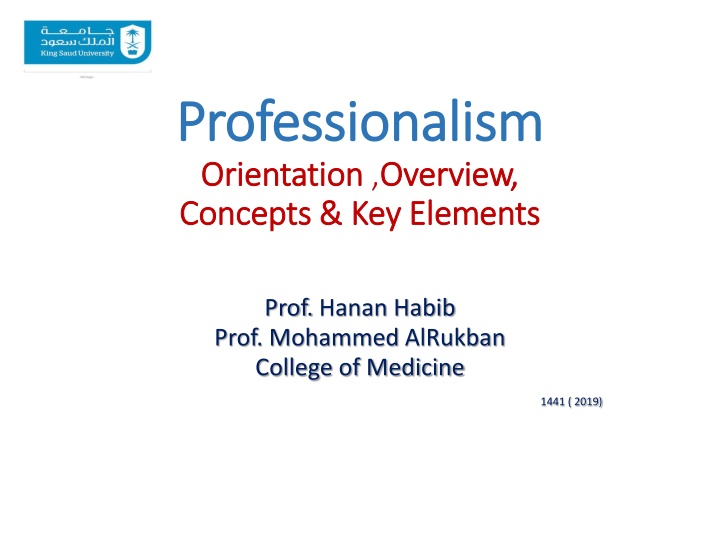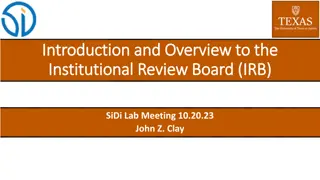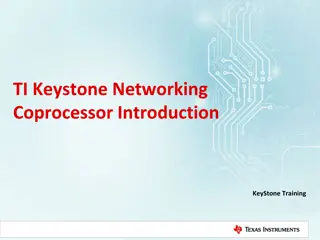
Professionalism Course Overview and Objectives
This overview introduces the professionalism course offered at the College of Medicine, focusing on key elements, aims, and objectives. The course aims to develop medical students' commitment to excellence, professionalism, and patient welfare. Objectives include defining professionalism attributes, effective teamwork, conflict management, lifelong learning, communication skills, and community service involvement.
Uploaded on | 3 Views
Download Presentation

Please find below an Image/Link to download the presentation.
The content on the website is provided AS IS for your information and personal use only. It may not be sold, licensed, or shared on other websites without obtaining consent from the author. If you encounter any issues during the download, it is possible that the publisher has removed the file from their server.
You are allowed to download the files provided on this website for personal or commercial use, subject to the condition that they are used lawfully. All files are the property of their respective owners.
The content on the website is provided AS IS for your information and personal use only. It may not be sold, licensed, or shared on other websites without obtaining consent from the author.
E N D
Presentation Transcript
Professionalism Professionalism Orientation Orientation ,Overview, Concepts & Key Elements Concepts & Key Elements Overview, Prof. Hanan Habib Prof. Mohammed AlRukban College of Medicine 1441 ( 2019)
Professionalism course Professionalism course SKL SKL- -223 Overview Overview 223
Professionalism Course Professionalism Course Course title : Professionalism Code : SKL 223 Target : Second year medical students Course duration : First semester Credit hours : Two hours
Professionalism Professionalism Orientation and Introduction to the Course Orientation and Introduction to the Course Aim and objectives of the professionalism course Teaching and learning strategies Student s assessment and evaluation References
Aims of the course Aims of the course The aim of the course is to have a graduate medical students with commitment to highest standards of excellence in the future practice of medicine and to sustain the interest ,welfare and safety of the patients. To display adequate responsibility towards the needs of the society.
Objectives of the course Objectives of the course 1. 2. Define the attribute of professionalism Practice effectively in teamwork during an inter-professional activity Demonstrate the attributes and behavior of a professional medical student Recognize and mange conflicts at work place Demonstrate commitment of life long learning and professional development and the capacity for reflection and self evaluation Communicate effectively with patients , their families, colleagues and other health professionals. Practice as a volunteer for the community services in collaboration with health societies and agencies. 3. 4. 5. 6. 7.
Professionalism course: Topics / Sessions Professionalism course: Topics / Sessions Eight topics/sessions : Five topics - one hour each, Three topics given in two sessions ( 2 hours) Read guide for tutors and students for details
Teaching methods Teaching methods Interactive lecture/group discussion Student led seminar/team based learning Inter-professional team Preparation of volunteering works and awareness campaigns Attending seminars in collaboration with health education.
Teaching methods Teaching methods student led seminar, projects & other activities student led seminar, projects & other activities Includes assignments and projects. Students at each group will be divided into 3 subgroups at the beginning of the academic year. Each subgroup shall participate in one topic/session ( preparation, discussion and presentation). Materials of the topic , summary handouts and references and instructions will be given to involved group earlier at the start of the course and before the day of the session to help in preparing the topic. Students in the presenting group will be evaluated after presentation and discussion. Evaluation of the involved group will be counted with continuous assessment ( 40 marks) All students must attend all activities and participate and will be evaluated by tutors.
Students Assessment Student s Assessment CA: seminar ,activities, projects, tutor evaluation and mini-OSCE = 40 marks Participation in group discussion and activities will also be evaluated even for one session topics. FINAL: MCQs & SAQs = 60 marks Total mark = 100
References References a) Project professionalism . American board of internal medicine (ABIM),2001 b) Feldman. M , Christensen. J. behavioral medicine . A guide for clinical practice(latest edition).New York. McGraw- Hill Medical c) Spandorfer. J, Pohl.CA , Rattner .SL, Nasca.TJ. professionalism in medicine. A case-based guide for medical students ( latest edition).Cambridge University Press.UK. d) Stern. DT. Measuring medical professionalism ( latest edition).Oxford University Press.UK e) References recommended by tutors.
Professionalism & Key elements Professionalism & Key elements Contents: Contents: -Definitions of professionalism -Why professionalism is important? -Concepts of professionalism -Key elements with practical examples (including highlight about accountability)
Do You Still Remember A Role Model Who Influenced Your Training? If Yes? Mention Some of Their Qualities and Attributes.
What does professionalism means to you? Take a few minutes and write down your thoughts as a definition or description.
What is Professionalism? It is not easy to define a profession, but it is likely to have all or some of the following characteristics: It is a vocation or calling that implies service to others It has a distinctive knowledge base which is kept up to date It determines its own standards and sets its own examinations It has a special relationship with those whom it serves e.g. patients, students . It has particular ethical principles
Professionalism is a term which embodies numerous qualities of physicians as public servants. It has been described by The American Board of Internal Medicine (ABIM) as: Constituting those attitudes and behaviors that serve to maintain others interest above physician Self-interest
Why Professionalism Is Important? Why Professionalism Is Important? There is a great increase in interest in developing medical professionalism of the students. The ethical demands upon medical profession have increased due to changes in the traditional modes of health care delivery, increased complexity in the methods of reimbursement, and developing national trends toward managed care. Most patients desire to be treated by a physician ,who is in addition to be competent, care deeply about his/her patients. Professionalism denote the way of behaving in accordance to certain normative values Professionalism is not about competent and skillful, it is about behaving in an ethical way Effective management of relationships.
Professionalism Key Elements Professionalism Key Elements 'Project Professionalism' (ABIM, 2001) Developed the Physician Charter and identified six key elements of professionalism: 1- Altruism (giving priority to patient interests rather than self-interests); 2- Accountability (being answerable to patients, society and profession); 3- Excellence (conscientious effort to perform beyond ordinary expectation, and commitment to life-long learning);
'Project Professionalism' (ABIM, 2001) 'Project Professionalism' (ABIM, 2001) 4- Duty (free acceptance of commitment to service i.e. undergoing inconvenience to achieve a high standard of patient care); 5- Honor and integrity (being fair, truthful, straightforward, and keeping to one's work); 6- Respect for other (respect for patients and families, colleagues, other healthcare professionals and students and trainees).
Concepts of Professionalism Concepts of Professionalism Professionals have codes, guidelines, creeds, oaths, commitments statements, belief statement such as statement on ethics. Professionals in many professions are licensed,certified and specific initial and advanced education, many require both initial and ongoing testing for admission and maintaining membership. Examples of professionals : medical doctors, teacher, engineers, pilots, etc,..
The concept of professionalism includes the following values: Communication Accountability Life-long learning Honesty Trust Service Commitment
Meanings of accountability Meanings of accountability 1- Responsibility 2- Self regulation in activities 3- Standard setting 4- Ability to resolve conflicts 5- Free acceptance of duties to serve public 6- Explain and give reason for actions
Why Accountability is important? Why Accountability is important? The key for providing optimal health care services Enables continuing improvement in healthcare system Helps in protecting the rights of patients Essential in resolving conflicts Essential for building trust and ensuring that workplace environment is safe and healthy Reflects behavior and attitude of responsible people. Important for enhancing community health through education , contributing in research projects and committing to volunteer works and awareness about diseases in community.
Professionalism Professionalism vs vs Ethics Ethics There is an overlap between professionalism and ethics Professionalism and ethics are different: Professionalism :are skills, competence and conduct displayed by an individual at certain profession. Ethics: are guides for an individual which clearly states the dos and don t s.
How professionalism can be How professionalism can be implemented? implemented?
Knowledge Decision making skills and clinical reasoning and judgment Patient management Professionalism What the doctor as a teacher is able to do Performance Of task Approach to task Basic, Social and clinical sciences Patient investigation Clinical skills Practical procedures Personal Development & Lifelong Learning Health promotion and Disease prevention Role of the doctor within the health service and community
Professionalism Role of the doctor within the health service Understanding of the health care system Understanding of clinical responsibilities Appreciation of doctor as researcher Appreciation of doctor as mentor or teacher Appreciation of doctor as manager including quality control Team working Personal Development Lifelong Learner Self awareness Self confidence Self regulation Self care Self control Personal time management Motivation Achievement drive Commitment initiative Career choice
How professionalism can be How professionalism can be taught? taught?
Do that.. & Don t do that
















